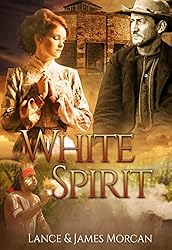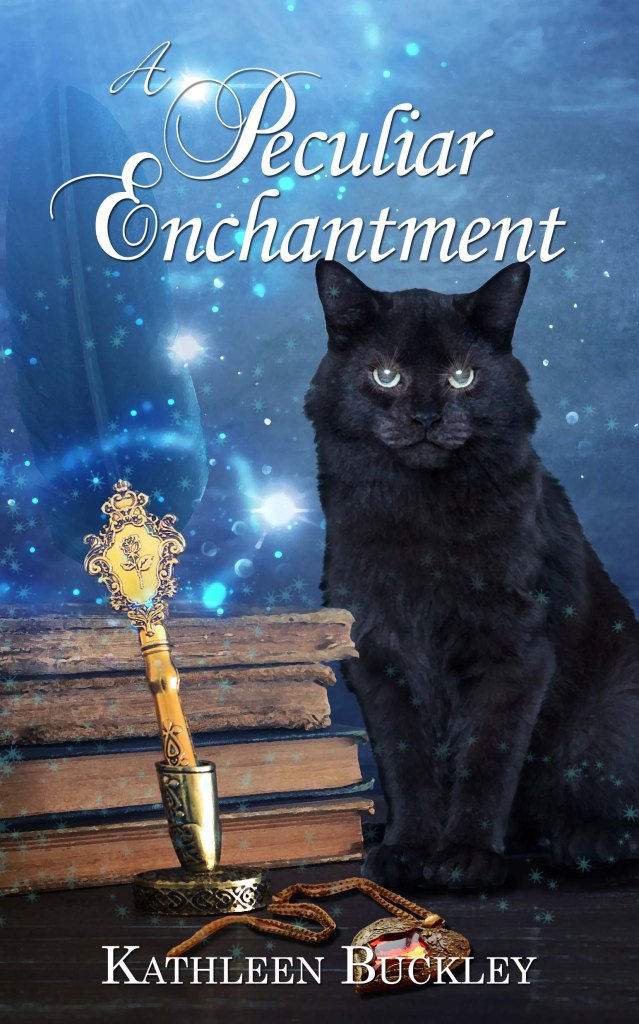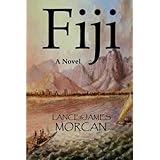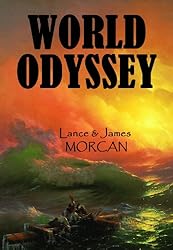For those who love historical adventures, romance and true-life, action-packed, wilderness survival tales, here’s an excerpt from our critically acclaimed, new release epic WHITE SPIRIT (A novel based on a true story) – set in 19th Century Australia.

WHITE SPIRIT / Chapter 1
A wiry Aboriginal tracker ran fast through the undergrowth, following tracks only he could see. He carried a spear in one hand and a nulla nulla, or club, in the other. Wearing only a loincloth, he covered the ground with effortless ease, his bare feet hardly touching the sun-baked earth.
This was Barega, one of the last surviving members of the mysterious Joondaburri, a tribe whose menfolk were renowned up and down Australia’s east coast for their superior tracking abilities. In the language of his people, his name meant the Wind, which was appropriate for he ran like the wind. To the British soldiers who employed him, he was simply known as the Tracker.
Although only average height, Barega’s legs were out of proportion in that they were unusually long in relation to his torso – a fact that gave him a distinct advantage in his chosen occupation. Few men, black or white, could match him for speed in a cross-country foot race, and, like others of his tribe, he could run all day long, seemingly without tiring or succumbing to the relentless heat.
The tracks he followed were those of three convicts who had escaped custody earlier that morning. They were heading west, away from the coast and away from Moreton Bay – the site of Britain’s newest penal colony and home to two hundred or so convicts and soldiers. The route was leading deeper into the tropical rainforest that hugged this part of the coast. It became progressively steeper as the hills gave way to mountains.
Barega was accompanied by three soldiers who followed him on horseback. He glanced back at them from time to time to ensure they remained in contact. Though their horses were doing most of the work, it was clear to him the men were having a hard time of it in the heat. They stopped every so often to drink from their water bottles.
Leading the way was Lieutenant Desmond Hogan, a dashing Englishman who was a career soldier through and through. Hogan’s ambition to succeed in his chosen career was hinted at by his senior ranking, which was an achievement in itself for one so young. He was only twenty-six. His rapid rise up the ranks had undoubtedly been influenced by the fact that his father and his father’s father had both been high ranking army officers, and he was candid enough to acknowledge that, but that didn’t change the fact he was a man of some ability whose promotion had largely been based on merit.
Hogan caught Barega’s eye. “How close, Tracker?” he asked.
Pulling up, the tracker pointed at the sun, which at that moment was to the northeast, and then he pointed dead north. “Soon, Mister,” he said by way of explanation, though no explanation was necessary.
The young lieutenant had used Barega so often he could readily understand the other’s hand signals. On this occasion, the tracker had indicated they’d catch up to their quarry by mid-day when the sun would be where he’d indicated – dead north. By Hogan’s reckoning, that would be in an hour’s time give or take. He glanced around at his two men. “Another hour should do it,” he said.
“Thank Christ,” one of them muttered.
Like their commanding officer, the two soldiers – both privates – had removed their red tunics, which now hung loosely from their saddles. It was the one allowance Hogan made for the heat, but only when out of sight of the penal settlement as it bucked the army’s rigid dress code.
Behind the pair, in the distance, Hogan could still see Moreton Bay. Trees concealed the penal settlement that had taken its name from the bay, but from the current vantage point there was an unobstructed view of the bay itself. And beyond it, the blue of the Pacific Ocean merged with the blue of the sky. It was a sight to behold.
Hogan and the others weren’t here to admire the view, however. They’d been tasked with capturing the runaways, and to a man they were aware the sooner they accomplished that the sooner they could return to base and enjoy some well-earned refreshments – and escape the accursed heat and humidity.
Ahead of them, Barega had resumed running. His black skin glistened with sweat as he picked up the pace. It was clear he sensed his prey were close now.
The soldiers followed, staying close to the tracker so as not to lose touch with him in the dense rainforest. Vines and creepers clawed at them, threatening to unseat them from their mounts, as they proceeded. Despite their discomfort, the soldiers were grateful the convicts had opted to keep to a well-worn trail carved out over the centuries by nomadic natives. They knew if their quarry had opted to deviate from the path, the horses would be no use to them and they’d have been forced to follow on foot.
Lieutenant Hogan knew something his men didn’t know, however. He alone knew they weren’t expected to bring all of the runaways back alive. Before setting out, the penal settlement’s commandant had made it very clear to Hogan privately that he’d be upset if more than one escapee survived.
Lord Bertram Cheetham’s reputation for cruelty had preceded him before he took up his new posting as Moreton Bay’s commander-in-chief four months earlier. Since then, Hogan and the other officers had come to see Cheetham’s reputation was well deserved; he viewed the convicts as animals and expected the soldiers under his command to treat them as such. As a result, floggings had become a daily event, the overworked convicts were starved and regularly beaten, and the dysentery and other ailments that plagued them and some of the soldiers, too, had reached epidemic proportions. Nearly every single convict had at least one serious illness or injury and, to make matters worse, medical care was basic to say the least. Despite this, as long as a convict could draw breath, he was forced to endure sixteen-hour days of hard labour, seven days a week.
So harsh were the conditions – reportedly as harsh as those at infamous Norfolk Island – a few convicts had opted to commit suicide rather than serve out their sentences, and more than a few others were contemplating such drastic action.
Another consequence of the cruelty was barely a week passed without one or more convicts attempting to escape. Where they hoped to escape to was anyone’s guess because Moreton Bay was many hundreds of miles from the nearest civilization. Convicts escaping overland risked death by heatstroke, thirst, starvation, snakebite or unfriendly natives, and escape by sea was out of the question because the only vessels visiting Moreton Bay were those servicing the penal settlement.
Rebellion was inevitable, of course, and since Lord Cheetham’s arrival illness, escape attempts and deaths amongst the convicts were all increasing. This had only served to infuriate Cheetham whose solution was to work the convicts even harder and to impose harsher punishments for any transgression.
Attempts by Hogan and the other officers to appeal to the commandant’s common sense, if not his humanity, had fallen upon deaf ears. Hence Cheetham’s private instructions to Hogan earlier that morning – to make an example of these latest escapees and ensure only one of them was returned to Moreton Bay alive. So desperate was he to deter the other convicts from attempting to escape.
Such instructions didn’t sit well with Hogan, but he felt his hands were tied. Experience had taught him if he returned the three escapees alive, the eccentric Cheetham was likely to order the execution of all three, and possibly one or two others as well. He’d seen that happen before.
In a clearing, Hogan glanced behind him and was distracted by the sight of a sailing ship some two or three miles offshore. She was far to the south – so distant that he wouldn’t have noticed her had it not been for her billowing white sails. They could easily have been mistaken for clouds had it not been a cloudless day. The young officer knew immediately the vessel was the Hoogley for she was the only one scheduled to visit Moreton Bay this week. She was bringing another shipment of convicts from the Parramatta penal settlement near Sydney Town. A regular occurrence these days. Had Hogan not been prevailed upon to supervise the capture of the escapees he’d have been tasked with greeting the Hoogley and her cargo of convicts. As it was, that particular chore would fall to his commanding officer on this occasion.
Though compassion and sympathy didn’t figure highly in his make-up, the lieutenant almost felt sorry for the men incarcerated in the hold of the schooner he was observing. Almost but not quite. He was aware that convicts unlucky enough to be shipped out to Moreton Bay, or to the other hell-hole that was Norfolk Island, were considered the most incorrigible of the convicts. Beyond Repatriation was the army’s official term for these men. As far as the military was concerned, they were unlikely to taste freedom again let alone ever return to their countries of origin. As far as Hogan was concerned, they deserved to rot in hell.
Hogan’s horse stumbled on the protruding root of a tree, forcing him to focus on the task at hand. He realised he’d lost sight of the tracker, and dug his heels into his mount’s flanks, encouraging the horse to move faster.

Offshore, the Hoogley was making hard work of it as she plied north through high, rolling seas. The conditions were the lingering aftermath of a storm, which, up until the previous evening, had battered the three-masted schooner without let-up since she’d departed Sydney Town six days earlier. Her timbers creaked in protest as her bow rose and fell alarmingly, and the waves that crashed over her threatened to tear the sails from their masts. In the rigging, high above deck, riggers hung on for dear life as they carried out their death-defying duties.
Below deck, the conditions were scarcely any better. As well as putting up with the rolling motion of the vessel, the forty mainly Irish convicts and their guards had to contend with the constant sea spray and saltwater, which poured through the portholes and open hatches, and which ensured the men remained permanently wet.
The convicts had the worst of it for they had been confined below deck for the entirety of the voyage. Permanently shackled, their ankles were secured by chains, which, in turn, passed through a longer chain bolted to the hull’s interior at each end of the hold. Their condition wasn’t helped any by the lack of adequate food and water throughout the voyage, nor by the temperatures, which soared in the confined space by day and dropped to near-freezing by night.
The overpowering stench of urine and shit combined with the ever-present bilge water that sloshed about in the bottom of the hold was all pervasive. An outbreak of dysentery early in the voyage had swept through the vessel, affecting convicts, guards and crew alike, adding to the misery of all.
Not all the convicts had survived the voyage. One, a sickly young man from Belfast, had succumbed to pneumonia. His body had been unceremoniously dumped at sea two days earlier. And several others were critically ill. Their condition wasn’t helped any by the fact there was no doctor or even any rudimentary medical facilities on board.
Harsh though this voyage was, it was nothing compared to the three or four-month journeys these convicts had originally endured out from England. In some cases, fatalities had been as high as forty per cent, and on one ship fatalities had topped sixty per cent.
Two survivors of that hellish voyage aboard the most notorious of prison ships were now aboard the Hoogley. Twenty-eight-year-old John Graham and the slightly younger Noel Thomas whose date of birth was unknown – unknown to Noel at least – were chained together toward the rear of the hold. Originally from Dundalk, in County Louth, Ireland, they were boyhood friends. The former had been sentenced to seven years’ transportation to Australia for stealing ten pounds from a shady employer he alleged hadn’t paid him, while the latter – hackneyed though it may sound – had been sentenced to five years for stealing a loaf of bread.
The two friends were a study in contrasts. John was broad-shouldered and taller than most of his companions, and certainly better looking. His unruly black, shoulder-length hair framed a pale but interesting face that women invariably found attractive. What really set him apart, however, was his startling blue eyes. Ever-alert, they missed nothing. Even here, chained in the hold of a ship, John constantly surveyed his fellows and the guards who watched over them.
Noel, on the other hand, was short and wiry, and not overly handsome. Nevertheless, he had an engaging manner and a cheeky wit that endeared him to all – all except his jailers that is. His cheekiness constantly landed him in trouble, with fellow convicts and guards alike, and John had had to come to his rescue more than once.
Chained alongside them was elderly Dubliner who was ailing rapidly. Leith Donovan, who claimed to be forty-five but looked to be all of sixty-five, had been ill even before departing Parramatta. He began throwing up as soon as the schooner set sail and was still throwing up now. In the last six days he’d lost damn near half his bodyweight.
“Hang in there, Leith,” Noel urged as Donovan disgorged the last of the meagre rations he’d managed to keep down. The remains of those rations, including vestiges of cabbage and corn, ended up on Noel’s leg.
“Sorry, Thomas,” Donovan mumbled as he made a half-hearted attempt to wipe the mess from his companion’s leg with his hand.
John glanced at Noel. His friend’s expression signalled that he thought it likely Donovan’s journey would end soon – an opinion that John shared.
Noel waved to the nearest guard to catch his attention. “We have a sick man here,” he said.
The guard, a callous Englishman who took every opportunity to show his contempt for the Irish, just grinned at Noel. He quickly looked away when he noticed John staring at him.
John Graham’s startling blue eyes had that effect. Few men could hold his gaze. There was something behind those eyes that unnerved them.

At the same time, in the hinterland behind Moreton Bay, the three convict escapees were so exhausted they had slowed to a walk. While they’d started out full of running in the cool of the pre-dawn, the exertion, heat and thirst had quickly reduced them to a slow shuffle. They weren’t helped either by the leg irons they wore. The heavy shackles made running almost impossible, and the clinking noise they made gave the convicts’ whereabouts away to anyone within fifty yards or so. Only the thought of what awaited them back at Moreton Bay should they be caught kept them going. To a man, they’d rather die than return to the place they called hell.
They were a mixed bunch. About all they had in common was they were English convicts with a shared yearning for freedom. And they were armed. The older man carried a tomahawk and the two younger men carried knives.
Tim Brady, the ringleader, was the oldest of the three by some years. A forty-five-year-old Cornishman, he was considerably shorter than his two companions, but he was almost as wide as he was tall. What he lacked in height he made up for with strength, and it was widely accepted he was the strongest of all the convicts – and all the soldiers, too, for that matter – at Moreton Bay.
Brady’s companions, both Cockneys and both in their early twenties, naturally looked to Brady for guidance. After all, the escape had been his idea. Unfortunately for them, Brady was now out of ideas and so exhausted he was no use to them or to himself for that matter.
The two Cockneys pulled up when they realised Brady had fallen behind.
“Hurry up Brady!” the younger man shouted.
Gasping for breath, the Cornishman tried to run, but his legs gave out from under him and he crashed to the ground. “Water,” he mumbled. “I need water.”
“We all need water, Brady!” the older Cockney said. “We ’ave to keep movin’.”
Brady slowly pushed himself to his feet and stumbled forward to catch up with his companions.
The two Cockneys looked at each other.
“He’s slowin’ us down,” one mumbled.
“Yeah fuck ’im,” the other said.
The pair took off, leaving Brady to fend for himself.
“Wait, you bastards!” Brady called. He hurried after them, desperate not to be left behind.
The first the Cornishman realised they had company was when the tip of the tracker’s spear skewered him from behind. He saw its tip emerge from his chest before he felt any pain. And what pain he felt was only fleeting as Barega’s nulla nulla smashed his skull, killing him moments after the spear had entered him.
Barega stopped only long enough to retrieve his spear then resumed running after the other two. Behind him, the sound of horses’ hooves told him the soldiers were close by. Ahead of him, he could hear the two Cockneys’ clinking leg irons as they crashed through the undergrowth.
Although less than fifty yards ahead of their pursuers, the surviving escapees had no clue they were about to be captured, or worse. For the moment, they were blissfully unaware of Brady’s untimely end or the fact that their freedom could now be measured in minutes, or less.
The first they realised the game was up was when the sound of the horses reached them. They immediately hid in dense bush and waited, their knives drawn.
Looking through the foliage, they were confused by a series of movements too quick for the eye to follow. Barega moved with such speed and stealth he gave the impression there were two or even three of him.
In the confusion, the younger Cockney moved, revealing his hiding place. It was the last thing he ever did. The tracker’s spear went straight through his throat, pinning him to a tree.
Terrified, the surviving convict took off, running blindly through the trees.
Not for the first time that day, twenty-three-year-old Frank Patterson pondered the wisdom of attempting to escape. In fact, he had regretted his decision almost immediately, but he’d made his choice and had to keep going.
Patterson didn’t see the nulla nulla that flew through the air, striking the back of his head and stunning him.
Barega retrieved his weapon and prepared to finish off the stunned Cockney. He was distracted by the arrival of Hogan and the others. His hesitation gave Patterson time to retrieve the long-bladed hunting knife he’d dropped. Barega brought his nulla nulla down hard, shattering his victim’s forearm and causing him to scream out in agony.
The tracker looked on, amused, as the desperate convict retrieved the fallen knife with his good hand and shaped up to attack again.
To Patterson’s surprise, Barega suddenly lay prone on the earth. The young Cockney glanced up to see the two soldiers with Hogan had their muskets pointed his way. Two shots rang out as a single volley. Such was his shock Patterson fell to the ground, convinced he was dead. It took him a moment or to realise he’d been spared. He looked up to see the soldiers were laughing at him.
“Welcome back to the land of the living, lad!” one of the soldiers shouted, prompting more laughter. They’d pulled the same trick on other escapees, aiming their weapons high or wide of their would-be victim, though Patterson wasn’t to know that.
Grinning, the tracker rose and pulled the long-bladed knife from the Cockney’s grasp, claiming it for himself. Such spoils were his as of right. That was the arrangement he’d made with the British. Barega beamed at Hogan who motioned to him to lift the relieved but still shocked survivor to his feet and start marching him back to Moreton Bay.

WHITE SPIRIT (A novel based on a true story) is exclusive to Amazon: https://www.amazon.com/White-Spirit-novel-based-story-ebook/dp/B01LWIRH9J/
************************************










